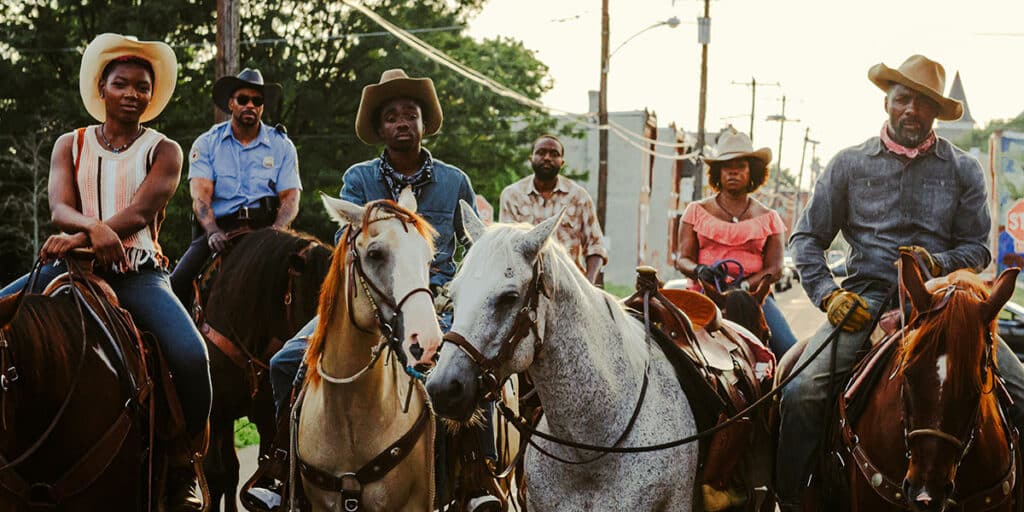Read also:
How to Watch FX Live Without CableHow To Watch AMC Without CableHow to Watch ABC Without CableHow to Watch Paramount Network Without CableCaleb McLaughlin and Idris Elba star in this promising directorial debut about modern-day cowboys.
(This review is part of our coverage of the 2020 Toronto International Film Festival.)
Richard III once said, “A horse, a horse, my kingdom for a horse!”; centuries later, one could easily imagine the faithful cowboys of the Fletcher Street Urban Riding Club – the real-life subjects of the film Concrete Cowboy – uttering those same words. Directed by Ricky Staub, this enlightening drama expands the popular image of the American cowboy, relocating its Western iconography to a Black, urban setting.
Set in Northern Philadelphia, Concrete Cowboy depicts its unexpected subculture from an outsider’s perspective. Staub’s film tells the story of a boy named Cole (Caleb McLaughlin), who encounters the urban cowboys by way of his dad Harp (Idris Elba). Cole is a troubled and troublesome teenager, and after one too many fights at his school, his mother forces him to spend the summer with his estranged dad.
Uprooted from his home in Detroit to the unfamiliar environs of Philadelphia, Cole’s arrival is largely met with indifference by Harp. He quickly learns that his father’s greater concerns are his horses and his fellow riders. Feeling rejected, Cole turns to his childhood friend Smush (Jharrel Jerome), who is now involved in the local drug trade. And as this reunion causes further tensions with his disapproving father which force Cole to make important decisions about his path in life.

Concrete Cowboy’s emotional screenplay, co-written by Staub and Dan Walser, lays it on thick in the opening scenes. At her wit’s end following his expulsion from school, Cole’s mother warns him “You are drowning out here. You are going to drown!” And after she drops him off on Harp’s stoop on a lonely night, Cole begs, “Mama, please don’t leave me here!”
It’s clear from the start that tough love is the name of the game. And even the neighbor – Lorraine Toussaint in another no-frills, no-nonsense role – is in on it. She simply reminds him that he’s grown up now and tells him to go to the Fletcher Street stables.
Tough love’s most ardent champion turns out to be Harp, who’s frustratingly reticent when it comes to his son. Sadly, it feels like minor work from Elba, who struggles to figure out the character. Is he a deadbeat dad or a community organizer? The film seems unsure.
Concrete Cowboy has the makings of an edgier Boyz ‘n the Hood, but its father-son relationship lacks heart. As the film depicts the grittier aspects of urban life, Jerome fares better through his easygoing chemistry with McLaughlin. As a result, it’s understandable, albeit disappointing, when Cole begins to be seduced by the fast life.
Concrete Cowboy has the makings of an edgier Boyz ‘n the Hood, but its father-son relationship lacks heart.
Despite some shaky character development, Concrete Cowboy eventually does find its footing. As we learn more about these people’s past, present, and their future aspirations, the story starts to come together nicely. Cole’s growing affinity for the cowboy lifestyle leads to an eventful summer, allowing Staub to play with genre in interesting ways. If nothing else, Concrete Cowboy is a strong calling card for Staub’s range as a director.
Though it may not possess the most inspired screenplay, Concrete Cowboy serves as a promising directorial debut. Perhaps more importantly, it draws attention to a vibrant subculture of the Black experience, the Black rodeo (a subject covered by the excellent Rob Morgan film Bull earlier this year). Apart from being a cool pastime, the lifestyle intersects with vital issues surrounding land ownership and gentrification. As such, it’s a deeply American story, bringing to mind Langston Hughes’ essential question: What happens to a dream deferred? As we witness these cowboys – many of them being real Fletcher Street riders – marching on in the face of hopelessness, Concrete Cowboy suggests one answer. They persevere.